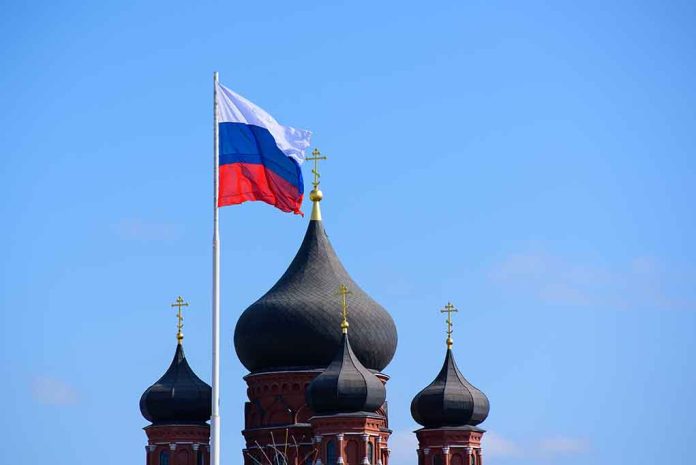
Russia’s President Vladimir Putin extends an olive branch to Western ambassadors, emphasizing Russia’s readiness for mutually beneficial cooperation.
At a Glance
- Putin stresses Russia’s willingness to engage in cooperative global relations
- The initiative aims to reinforce Russia’s influence in world affairs
- Putin advocates for a fair global balance and Russia’s active role in international diplomacy
- The move reflects a push towards asserting Russian interests while promoting dialogue with Western nations
Putin’s Diplomatic Outreach
In a significant diplomatic move, Russian President Vladimir Putin has extended a hand of cooperation to Western ambassadors, including Israel’s envoy Simona Halperin. During a ceremony where new ambassadors presented their credentials, Putin emphasized Russia’s commitment to fostering mutually beneficial relations on the global stage. This gesture comes at a time when Russia’s international standing has been challenged, particularly in the wake of its actions in Ukraine.
Putin’s overture appears to be a calculated attempt to reposition Russia as a constructive player in international affairs. By advocating for a fair global balance and highlighting Russia’s willingness to engage in cooperative relations, the Russian leader is signaling a desire to move beyond recent tensions and reassert Russia’s influence in shaping global governance.
Balancing Act in International Relations
The diplomatic initiative comes against a backdrop of complex geopolitical dynamics, particularly involving Russia’s relationships with countries like Türkiye and China. Türkiye’s role as a NATO ally has been complicated by its deepening ties with Russia, raising concerns among Western partners. The Carnegie Endowment’s recent analysis highlights the delicate balance Türkiye is attempting to maintain between its traditional Western alliances and its growing relationship with Russia.
NATO documents, which Türkiye has signed off on, indicate the organization’s belief that Russia itself is “the most significant and direct threat to Allies’ security.”
This quote from NATO documents underscores the tension between Russia’s diplomatic overtures and the perception of Russia as a security threat by Western allies. Putin’s recent statements seem aimed at countering this narrative and presenting Russia as a potential partner rather than an adversary.
Strategic Partnerships and Global Influence
While reaching out to Western nations, Russia continues to strengthen its ties with China. The recent meeting between Putin and Chinese President Xi Jinping in Beijing highlighted the strategic importance of their bilateral relationship. Both leaders signed agreements to deepen their comprehensive strategic partnership, emphasizing their commitment to promoting multipolarity and economic globalization.
“The China-Russia strategic partnership has set an example for successful relations between major powers that can withstand the turbulence of the world, and it’s also the key to maintaining the strategic balance of international relations,” said Li Haidong, a professor at the China Foreign Affairs University.
Challenges and Opportunities Ahead
Despite Putin’s call for cooperation, significant challenges remain in Russia’s relationships with Western nations. The ongoing conflict in Ukraine continues to be a major point of contention, with many Western countries maintaining sanctions against Russia. Putin’s characterization of these sanctions as “illegal” during his address to the diplomats highlights the ongoing tensions.
However, the Russian leader’s emphasis on mutually beneficial cooperation suggests a potential opening for dialogue. As global challenges such as climate change, terrorism, and economic instability continue to demand collective action, Putin’s overture may provide an opportunity for cautious engagement on issues of shared concern.
As the international community navigates these complex diplomatic waters, the coming months will likely reveal whether Putin’s call for cooperative relations will translate into concrete actions and whether Western nations are willing to explore avenues for renewed dialogue with Russia.
Sources:
- https://carnegieendowment.org/research/2024/10/understanding-turkiyes-entanglement-with-russia
- https://www.globaltimes.cn/page/202405/1312473.shtml
- https://www.timesofisrael.com/liveblog_entry/putin-tells-diplomats-including-israeli-envoy-russia-committed-to-mutually-beneficial-cooperation/
- https://www.newsmax.com/newsfront/peace-war-russia/2024/11/05/id/1186709










